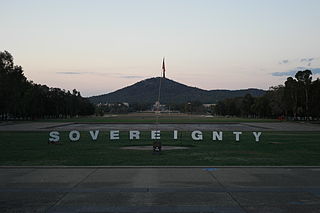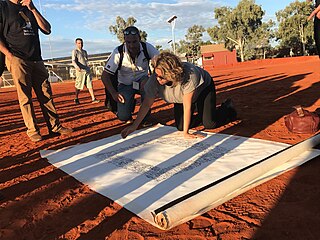Related Research Articles

Mabo v Queensland is a landmark decision of the High Court of Australia that recognised the existence of Native Title in Australia. It was brought by Eddie Mabo against the State of Queensland and decided on 3 June 1992. The case is notable for being the first in Australia to recognise pre-colonial land interests of Indigenous Australians within the common law of Australia.

Wik Peoples v The State of Queensland is a decision of the High Court of Australia delivered on 23 December 1996 on whether statutory leases extinguish native title rights. The court found that the statutory pastoral leases under consideration by the court did not bestow rights of exclusive possession on the leaseholder. As a result, native title rights could co-exist depending on the terms and nature of the particular pastoral lease. Where there was a conflict of rights, the rights under the pastoral lease would extinguish the remaining native title rights.

'Edward Koiki Mabo 29 June 1936 – 21 January 1992) was an Indigenous Australian man from the Torres Strait Islands known for his role in campaigning for Indigenous land rights in Australia, in particular the landmark decision of the High Court of Australia that recognised that indigenous rights to land had continued after the British Crown acquired sovereignty and that the international law doctrine of terra nullius was not applicable to Australian domestic law. High court judges considering the case Mabo v Queensland found in favour of Mabo, which led to the Native Title Act 1993 and established native title in Australia, officially recognising the rights of Aboriginal and Torres Strait Islander people in Australia.

Australian Indigenous Sovereignty refers to various rights claimed by Aboriginal and Torres Strait Islander peoples over parts or all of Australia. Such rights are said to derive from Indigenous peoples' occupation and ownership of Australia prior to colonisation and through their continuing spiritual connection to land. Indigenous sovereignty is currently not explicitly recognised in the Australian Constitution or under Australian law.
Native title is the designation given to the common law doctrine of Aboriginal title in Australia, which is the recognition by Australian law that Indigenous Australians have rights and interests to their land that derive from their traditional laws and customs. The concept recognises that in certain cases there was and is a continued beneficial legal interest in land held by Indigenous peoples which survived the acquisition of radical title to the land by the Crown at the time of sovereignty. Native title can co-exist with non-Aboriginal proprietary rights and in some cases different Aboriginal groups can exercise their native title over the same land.
Henry Reynolds, is an Australian historian whose primary work has focused on the frontier conflict between European settlers in Australia and Indigenous Australians.
Indigenous land rights are the rights of Indigenous peoples to land and natural resources therein, either individually or collectively, mostly in colonised countries. Land and resource-related rights are of fundamental importance to Indigenous peoples for a range of reasons, including: the religious significance of the land, self-determination, identity, and economic factors. Land is a major economic asset, and in some Indigenous societies, using natural resources of land and sea form the basis of their household economy, so the demand for ownership derives from the need to ensure their access to these resources. Land can also be an important instrument of inheritance or a symbol of social status. In many Indigenous societies, such as among the many Aboriginal Australian peoples, the land is an essential part of their spirituality and belief systems.
The Faculty of Law and Justice of the University of New South Wales is a law school situated in Sydney, Australia. It is widely regarded as one of Australia's top law schools. The 2021 QS World University Rankings rank the UNSW Law Faculty 13th in the world, first for undergraduate law in Australia, 2nd overall in Australia and 3rd in the Asia-Pacific region, and the 2021 Times Higher Education subject rankings also rank it second in Australia, making it the top ranked law school in New South Wales according to both tables, as well as being the top undergraduate Law school in the country.
Indigenous Australian self-determination, also known as Aboriginal Australian self-determination, is the power relating to self-governance by Aboriginal and Torres Strait Islander peoples in Australia. It is the right of Aboriginal and Torres Strait Islander peoples to determine their own political status and pursue their own economic, social and cultural interests. Self-determination asserts that Aboriginal and Torres Strait Islander peoples should direct and implement Aboriginal and Torres Strait Islander policy formulation and provision of services. Self-determination encompasses both Aboriginal land rights and self-governance, and may also be supported by a treaty between a government and an Indigenous group in Australia.
Aaron Ronald Castan was an Australian barrister and human rights advocate.

The Declaration on the Rights of Indigenous Peoples is a legally non-binding resolution passed by the United Nations in 2007. It delineates and defines the individual and collective rights of Indigenous peoples, including their ownership rights to cultural and ceremonial expression, identity, language, employment, health, education, and other issues. Their ownership also extends to the protection of their intellectual and cultural property. The Declaration "emphasizes the rights of Indigenous peoples to maintain and strengthen their own institutions, cultures and traditions, and to pursue their development in keeping with their own needs and aspirations." It "prohibits discrimination against indigenous peoples," and it "promotes their full and effective participation in all matters that concern them and their right to remain distinct and to pursue their own visions of economic and social development".
Indigenous Australian customary law refers to the legal systems and practices uniquely belonging to Indigenous Australians of Australia, that is, Aboriginal and Torres Strait Islander people.
Indigenous land rights in Australia, also known as Aboriginal land rights in Australia, relate to the rights and interests in land of Aboriginal and Torres Strait Islander people in Australia, and the term may also include the struggle for those rights. Connection to the land and waters is vital in Australian Aboriginal culture and to that of Torres Strait Islander people, and there has been a long battle to gain legal and moral recognition of ownership of the lands and waters occupied by the many peoples prior to colonisation of Australia starting in 1788, and the annexation of the Torres Strait Islands by the colony of Queensland in the 1870s.
The Indigenous Land and Sea Corporation (ILSC) is an Australian federal government statutory authority with national responsibilities to assist Aboriginal and Torres Strait Islander people to acquire land and to manage assets to achieve cultural, social, environmental and economic benefits for Indigenous peoples and future generations. It was established as the Indigenous Land Corporation (ILC) following the enactment of the Native Title Act 1993.
The Aboriginal Legal Service (NSW/ACT) (ALS), known also as Aboriginal Legal Service, is a community-run organisation in New South Wales and the Australian Capital Territory, founded in 1970 to provide legal services to Aboriginal Australians and Torres Strait Islanders and based in the inner-Sydney suburb of Redfern. It now has branches across NSW and ACT, with its head office in Castlereagh Street, Sydney and a branch office in Regent Street, Redfern.

Megan Jane Davis is an Aboriginal Australian activist and international human rights lawyer. She was the first Indigenous Australian to sit on a United Nations body, and was Chair of the UN Permanent Forum on Indigenous Issues. Davis is Pro vice-Chancellor, Indigenous, and Balnaves Chair in Constitutional Law at the University of New South Wales. She is especially known for her work on the Uluru Statement from the Heart.
Patricia Audrey Anderson is an Australian human rights advocate and health administrator. An Alyawarre woman from the Northern Territory, she is well known internationally as a social justice advocate, advocating for improved health, educational, and protection outcomes for Indigenous Australian children.

The Uluru Statement from the Heart is a 2017 petition by Australian Aboriginal and Torres Strait Islander leaders to change the constitution of Australia to improve the representation of Indigenous Australians.

Jody Broun is an Indigenous Australian artist and activist with a long-standing career, most recently with her current position being Chief Executive Officer of the National Indigenous Australians Agency. She has completed a Diploma of Teaching, Bachelor of Education and a Masters in Philosophy. In 1998 she was awarded first prize in the Telstra National Aboriginal and Torres Strait Islander Art Award for her artwork "White Fellas Come To Talk Bout Land" and in 2005 Broun was awarded first place in the Canberra Art Prize for her artwork "Half-Time Game". Along with these major awards Broun has displayed many artworks in solo and group exhibitions, winning many other awards, and grants. Broun is a Yindjibarndi woman with family connection from the Pilbara region in North Western Australia, and is known for her dedication to Indigenous communities in Australia.
Neil Richard Balnaves was an Australian media executive and arts philanthropist. His production companies were responsible for bringing Big Brother and Bananas in Pyjamas to Australian television screens.
References
- 1 2 3 4 "About Us". Indigenous Law Centre. 1 October 2020. Retrieved 2 November 2020.
- ↑ Koowarta v Bjelke-Petersen [1982] HCA 27 , (1982) 153 CLR 168(11 May 1982), High Court
- ↑ Mabo v Queensland (No 2) [1992] HCA 23 , (1992) 175 CLR 1(3 June 1992), High Court
- 1 2 "Core research areas". Indigenous Law Centre. 10 June 2020. Retrieved 3 November 2020.
- ↑ "UNSW Professor named Chair in Constitutional Law". Inside UNSW. 2 June 2020. Retrieved 28 April 2022.
- ↑ "Megan Davis". Uluru Statement from the Heart. Retrieved 28 April 2022.
- ↑ "Violence against Indigenous women and children". Indigenous Law Centre. 28 October 2013. Retrieved 3 November 2020.
- ↑ "Indigenous Land Reform Project". Indigenous Law Centre. 28 October 2013. Retrieved 3 November 2020.
- ↑ "Remote Indigenous housing and home ownership". Indigenous Law Centre. 11 December 2012. Retrieved 3 November 2020.
- ↑ University of New South Wales. Indigenous Law Centre (1996–2020), "Australian indigenous law review [catalogue entry]", Trove, Indigenous Law Centre, University of New South Wales, ISSN 1835-0186 , retrieved 3 November 2020
- ↑ "Australian Indigenous Law Review". JSTOR. Retrieved 3 November 2020.
- ↑ "Australian Indigenous Law Review". University of New South Wales. Indigenous Law Centre. Retrieved 3 November 2020.
- ↑ Aboriginal Law Centre (Sydney, N.S.W.); Aboriginal Law Research Unit (Sydney, N.S.W.) (1981–1995), "Aboriginal Law Bulletin [catalogue entry", Trove, Aboriginal Law Research Unit, ISSN 1328-5475 , retrieved 3 November 2020
- ↑ "Indigenous Law Bulletin". University of New South Wales. Indigenous Law Centre. Retrieved 3 November 2020.
